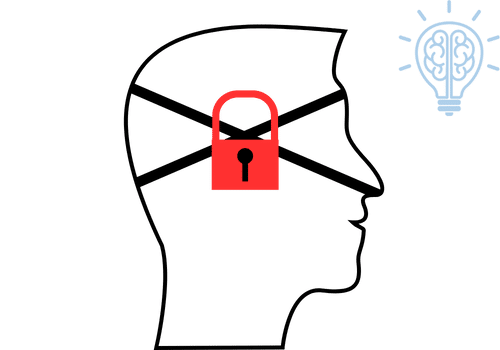What Are Destructive Mindsets?
Destructive mindsets are patterns of negative thinking that reinforce self-doubt, fear of failure, and avoidance of challenges. These thought patterns can limit personal growth, hinder motivation, and negatively impact decision-making.
Unlike a growth mindset, which fosters learning and resilience, this negative mindset keeps individuals stuck in unproductive habits and prevent them from reaching their full potential.
Common Types of Destructive Mindsets
They take many forms, but some of the most common include:
⚠️ All-or-Nothing Thinking
Viewing situations in extremes—either as a complete success or a total failure—without recognizing progress.
⏳ Procrastination Mindset
Believing that waiting until the “perfect time” to start something is necessary, leading to chronic delay.
🔄 Rumination and Overthinking
Dwelling on past mistakes or worries instead of taking action to move forward.
🚫 Fear of Failure
Avoiding challenges because of the belief that failure defines self-worth.
🔍 Perfectionism
Setting unrealistic standards and feeling like nothing is ever “good enough.”
🚪 Self-Sabotage
Undermining personal success due to deep-seated fears of change or uncertainty.
Why Are Destructive Mindsets Harmful?
Destructive mindsets negatively impact confidence, decision-making, and emotional well-being. They can:
🧠 Limit Executive Function Skills
Negative thinking disrupts planning, problem-solving, and self-regulation.
📉 Decrease Productivity
Procrastination and perfectionism prevent effective task completion.
💬 Affect Self-Perception
Negative self-talk reinforces a fixed mindset and lowers self-esteem.
⚖️ Increase Stress and Anxiety
Rumination and overthinking make it difficult to move forward confidently.
How Destructive Mindsets Relate to Executive Function
Destructive mindsets interfere with several key executive function skills:
- Cognitive Flexibility: Rigid thinking prevents adapting to challenges.
- Inhibitory Control: Emotional reactions override rational decision-making.
- Task Initiation: Fear of failure leads to avoidance behaviors.
- Self-Monitoring: Negative thought loops make it hard to recognize progress.
- Goal-Directed Persistence: Giving up easily due to discouragement or frustration.
Common Challenges in Overcoming Destructive Mindsets
Breaking free from negative thinking patterns can be challenging due to:
- ⚡ Long-standing thought habits reinforced over time.
- ⏳ Fear of discomfort associated with change.
- 🚧 Lack of awareness of unhelpful thought patterns.
- 🔄 Self-fulfilling cycles of negative beliefs.
Effective Strategies for Shifting Destructive Mindsets
With conscious effort, these mindsets can be replaced with healthier perspectives. Here’s how:
✅ 1. Challenge Negative Self-Talk
Identify and reframe limiting beliefs. Instead of “I’m terrible at this,” try “I’m still learning and improving.”
✅ 2. Focus on Progress, Not Perfection
Celebrate small wins rather than striving for impossible standards.
✅ 3. Use “Yet” Statements
Shift thinking from “I can’t do this” to “I can’t do this yet.”
✅ 4. Break the Rumination Cycle
Set a time limit for dwelling on mistakes and then shift focus to solutions.
✅ 5. Adopt a Growth Mindset
View challenges as opportunities to learn rather than obstacles to success.
✅ 6. Use Visualization Techniques
Picture success and the steps needed to get there.
✅ 7. Develop Self-Monitoring Habits
Regularly check in on thought patterns and adjust perspectives as needed.
How Executive Function Coaching Can Help with Destructive Mindsets
For individuals struggling with negative thought loops or self-doubt, executive function coaching provides personalized strategies to develop a more constructive mindset. Coaching can assist with:
- Identifying and reframing limiting beliefs.
- Strengthening cognitive flexibility and problem-solving skills.
- Encouraging resilience and adaptability.
- Enhancing self-monitoring to recognize destructive patterns early.
By actively working to replace destructive mindsets with more adaptive thinking, individuals can improve motivation, productivity, and overall mental well-being.
📞 Want to break free from destructive mindsets? Contact us for executive function coaching today!




